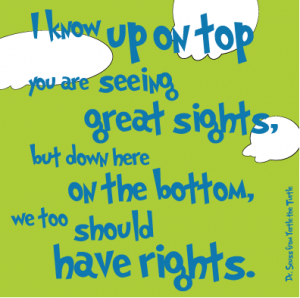This past weekend I had the great honor and pleasure to deliver a keynote address to the 6th Annual Equity and Social Justice Conference held at the State University of New York at New Paltz.
I would like to thank the conference organizers for inviting me to participate in an exciting day that included many cutting edge papers as well as a provocative and high energy performance/workshop by the Hip Hop Psychology Performing Arts Movement.
My keynote, titled “Dr Seuss and Dangerous Citizenship” explored the efforts of governments (in British Columbia, Arizona, and Texas) to keep schools “political neutral” and how these actions actually undermine opportunities for objective teaching and curriculum. I outline the contexts of rulings that have restricted the rights of teachers to express political views in BC (specifically in Prince Rupert where teachers have been banned from using particular Dr Seuss books and in a bizarre irony have also been prohibited from wearing t-shirts displaying portions of the Canadian Charter of Rights and Freedoms). I also outline the attacks on Tucson (AZ) school district’s Mexican American Studies program and the right wing Christian revisions of the Texas history curriculum, which demote Thomas Jefferson and promote St. Thomas Aquinas; deletes abolitionist Harriet Tubman and highlights the Confederacy; and emphasizes the role of religion in American society at the expense of the US Constitutional separation of church and state.
If political expression is repressed and restricted in schools (and it certainly is, as I illustrate in this talk) then there are reduced opportunities to critically examine knowledge claims. The ideology of neutrality that dominates current thought and practice in schools (and teacher education) is sustained by theories of knowledge and conceptions of democracy that constrain rather than widen civic participation and functions to obscure political and ideological consequences of so-called “neutral” schooling, teaching, and curriculum. The consequences include conceptions of the learner as passive; democratic citizenship as a spectator project; and ultimately the maintenance of status quo inequalities in society.
I offer up “dangerous citizenship” as a framework I have developed along with Kevin D. Vinson (University of the West Indies) for re-thinking responses to these conditions and explore the work of interventionist artists as sources of inspiration for teaching and curriculum.
Download the paper and accompanying powerpoint from Academia.edu or below.
